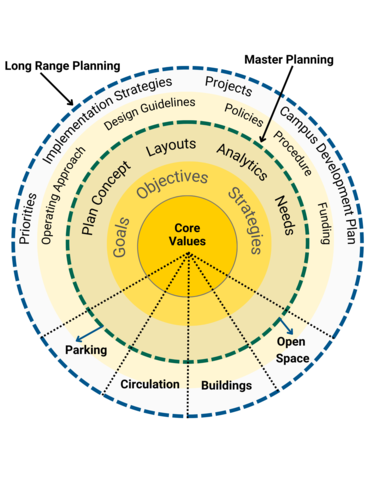Embracing the Past, Ready for the Future
Master Planning is the process of transforming program needs into reality. This process includes identifying what the best actions are to support the University's current operations and strategic aspirations.
University of Iowa Master Planning is based on the premise that the Master Plan is an on-going planning process which has no beginning or end. It differs from the traditional, architecturally driven approach by introducing a more complex operating philosophy which:
- is scalable, diverse, and interactive
- can have numerous physical development options
- takes a team effort, thus strengthening ownership and accountability
- allows for varying levels of detail and progress amongst the themes
- is managed with internal resources
- has a common vision and framework by which all development follows
- is data driven, policy shaped, budget aligned, and design influenced
- balances long-term structure with flexible and adaptable near-term options
- is a tool for long-term decision making.
The University's built environment is a comprehensive network of land, buildings, and infrastructure that support the complex and diverse organization. The University of Iowa Master Plan is a collection of the following themes, each of which are rooted in the University's Core Values.
General Information
- Process/Planning System
- Development Strategies (Capital)
- Historic Contex
- Campus Setting
- Neighborhood Context
- Core Values
- Framework Plan

Buildings
- Building Condition
- Building Use, New Buildings
- Program Use and Needs
- Space Plan
- Architecture
- Form and Scale
- Aesthetics and Materials

The Site
- Campus Topography
- Land Use
- Urban Design Districts
- Open Space
- Gathering Areas
- Visitas and Viewsheds
- Edges and Gateways
- Wayfinding
- Vehicular Systems
- Routes and Paths (w/cambus)
- Parking Bikeways (non-motorized systems)
- Routes and Paths
- Parking
- Pedestrian Systems
- Routes and Paths
- Accessibility
- Site Amenities
- Art Display
- Vegetation

Utility Infrastructure
- Production
- Power Plant
- Chiller Plant
- Water Plant
- Electric (Substation)
- Distribution
- Lighting
- Chilled Water
- Electrical
- Domestic Water
- Steam
- Condensate
- Sanitary Sewer
- Storm Sewer
- Telecom/Data
Each theme has its own detailed plan consisting of the four basic stages in the planning process. Each stage, or ring as shown in the graphic below, is built upon and provides more detail than the previous inner ring. The first two stages make up the master planning phases of a theme's plan. The third and fourth stages complete a theme's long range plan and provides detailed action plans for improvement.
Stage Description
Master Planning
1. Theme specific goals, objectives, and strategies needed to support the core values.
2. Analysis, needs and concept plans to meet the goals and objectives.
Long Range Planning
3. Policies, procedures, operating plans, design guidelines, and funding strategies, needed for plan development.
4. Project development, prioritization, and implementation strategies needed to inform the University’s Campus Development Plan.

